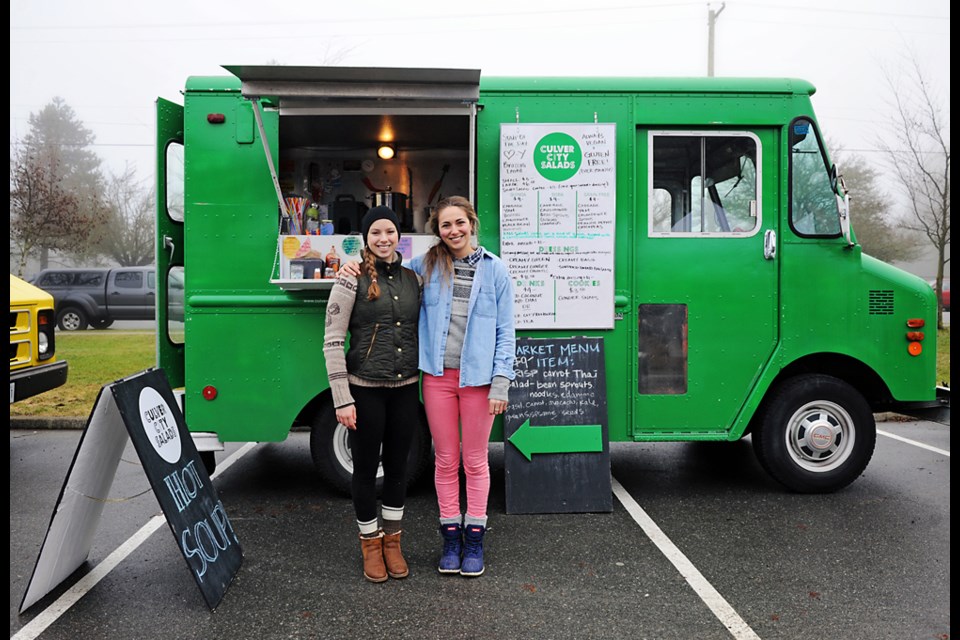Stationed at the very end of the parking lot of Nat Bailey Stadium was the Soho Road food cart. Sarb Mund had just finished stringing up his lights, twinkling gold against his black cart from which he recently ripped out the conventional oven for a tandoor oven and a whole lot of authenticity — especially if you happen to be from Birmingham, England.
“You usually don’t see Indian food, straight-up UK Indian food, at a farmers market,” said Mund who is usually found at his downtown location at West Georgia and Granville.
“It’s a big deal to be leaving our spot on a Saturday, we kinda pride ourselves on being more downtown than farmers market. Always wanted to do it but we got a little snobby,” he said with a laugh, “We love being around other food trucks.”
Last weekend was the third Saturday of the January Food Truck Festival which is part of the Winter Farmers Market that runs out of the baseball stadium’s parking lot until April.
Five new food trucks, including Soho Road, are at the festival each weekend this month along with the regulars. The best-liked of the bunch, decided by public vote, is awarded a regular spot at the summer farmers markets.
“The food trucks like us in the winter because it’s not quite as busy on a street corner on a winter day as it is in the summer,” said Vancouver Farmers Market district manager Laura Smit while she directed trucks into their parking spots within feet of each other.
“They know if they come here they already have a captive audience.”
The cheery green truck next to Soho Road did a tour of duty in the 1980s for Canada Post, was then sold to ice cream sellers, and now Christina Culver owns it as a mobile base for Culver City Salads.
Working at the farmers market is a perfect fit, said co-worker and sister Sarah Culver, as their market menu item, one of the categories voted on by market-goers, features carrots purchased from organic grower Crisp, a truck-length distance away.
“We had some friends’ boyfriends eat the salad and, at first, they didn’t want the salad because they wanted Thai food,” said Sarah, the younger Culver. “But afterwards they agreed they’d never had so much flavour in their mouths.”
The entrepreneurial spirit runs in the family as the girls’ father, Bruce, owns his own landscaping business.
“Most of all, I like working with my sister,” said Sarah. “Our whole family is involved. My mom has worked on the truck, my brother, my brother’s girlfriend. It’s really a family business. Our dad will drive by in his truck and ask, ‘Okay, what do you need fixing?’ He’ll pull out his tools, fix whatever needs to be fixed and then carry on.”
Culver City Salads was the second-favourite truck going into the day, right behind leader Soho Road.
At the other end of the market, the regulars also had line-ups.
Chili Tank’s Steve Forster, whose face was sometimes obscured by rolling steam coming from his chili machine — a 1943 mobile soup kitchen once owned by the Czechoslovakian army — said the best thing about working the farmers markets is the people. He recalled an older fellow who watched in tears as he doled out chili.
Turns out the man, as a 12-year-old boy, had been separated from his parents during the Second World War and during his six months living with Allied soldiers had eaten out of a military soup kitchen every day.
“A year and a half later, he was reunited with his parents. He didn’t know they had survived,” remembers Forster. “He hadn’t seen one of these machines in 68 years, he was blown away.”
The people and the mobile food community were reason enough for Mund to quit his job as an accountant in 2011.
“I’ve done the desk job and all that. I made the switch as soon as I got my truck designation,” he said. “We have a cool day, every day.”



